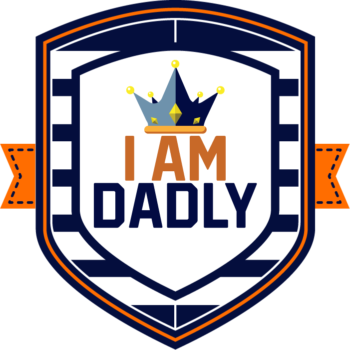
Today, we continue our Dadly Daily Declaration series with readings from The Passion Paradox by authors Brad Stulberg and Steve Magness. So far, Stulberg and Madness have discussed the pitfalls of passion and the sole focus of pursing your passion. Today’s reading focuses on a technique to become self-aware and avoid the pitfalls of becoming too encompassed in your passion: perspective.
Help support I Am Dadly. We use Amazon Affiliates to help offset the costs of this site. We receive a small commission on each book you purchase through our Amazon links. If you're interested in this terrific read and want to buy it, we'd appreciate if you could use our Amazon Affiliate link!
Here are a few gems from today’s reading:
- When we are pursuing a passion, our perspective is anything but orbital. We are completely zoomed in. Our world narrows and our focus constricts so that our seeing, thinking, and feeling are dominated by the activity that we are passionate about. Living life in such a zoomed-in state allows us to accomplish incredible things, like winning triathlon world championships, discovering cures for diseases, or writing beautiful symphonies.
- But it also prevents us from seeing a broader picture. When we lose perspective—when all we can see is our passion—we lose the ability to choose what we want to do with our lives. It’s like a fish that knows nothing exists beyond life underwater. This sounds trite, but it’s true. When we are really going for something, for better or worse, passion all too easily takes over. In order to prevent ourselves from succumbing to passion-driven autopilot and to reclaim at least a modicum of say in the matter of how we spend our time, attention, and energy—that is to say, how we spend our lives—we must recalibrate our perspective.
- University of California Berkeley psychology professor Dacher Keltner defines awe as the sense of wonder we feel “in the presence of something vast that transcends our understanding of the world.” Keltner’s research has found that there are a handful of easily accessible experiences that tend to elicit awe in most people:
- Immersing oneself in lush, natural environments;
- watching the sunset, stargazing, or observing a full moon;
- Viewing artistic works;
- Listening to music that moves you.
- Looking for examples of extraordinary human kindness (e.g., spending a day volunteering in a homeless shelter).
- Observing a craftsperson at work using their unbelievable skill (e.g., watching LeBron James playing basketball or Bette Midler acting on Broadway).
- Following these and other awe-inspiring experiences, we can’t help but view ourselves and our pursuits against a larger backdrop. Feeling awe forces us, even if only for a brief moment, to zoom out of our own lives and passions and realize that there are things beyond them.
- Similar to self-distancing, when we are in the midst of an awesome experience, we gain not only perspective but also the clarity required to more objectively evaluate what we call our true selves—what lies at our core beyond the pursuit of our passions—and how we are spending our time and energy. This is a type of clarity that is often absent when we are heads-down pursuing a passion.
- Sadly, science is demonstrating the great value of awe at a time when our culture is becoming increasingly awe-deprived. Thus, we must deliberately and actively seek it out. Here is Dacher Keltner: Adults spend more and more time working and commuting and less time outdoors and with other people. So often our gaze is fixed on our smartphones rather than noticing the wonders and beauty of the natural world or witnessing acts of kindness, which also inspire awe. Attendance at arts events—live music, theater, museums and galleries—has dropped in recent years. This goes for children, too: Arts and music programs in schools are being dismantled; time spent outdoors and for unstructured exploration is being sacrificed for résumé-building activities. At the same time, our culture has become more individualistic, more narcissistic, more materialistic, and less connected to others.
Those gems lead us to today’s Dadly Daily Declaration:
Don’t underestimate the power of goosebumps—actively seek out the experiences that nurture your own hunger for awe, be it through appreciating the trees in your neighborhood, a complex piece of music, patterns of wind on water, the person who presses on against all odds, or the everyday nobility of others.
When we expose ourselves to awe, we gain the perspective to make more thoughtful, fully conscious decisions about how we want to channel our energy, engage in our respective passions, and make big life choices.





